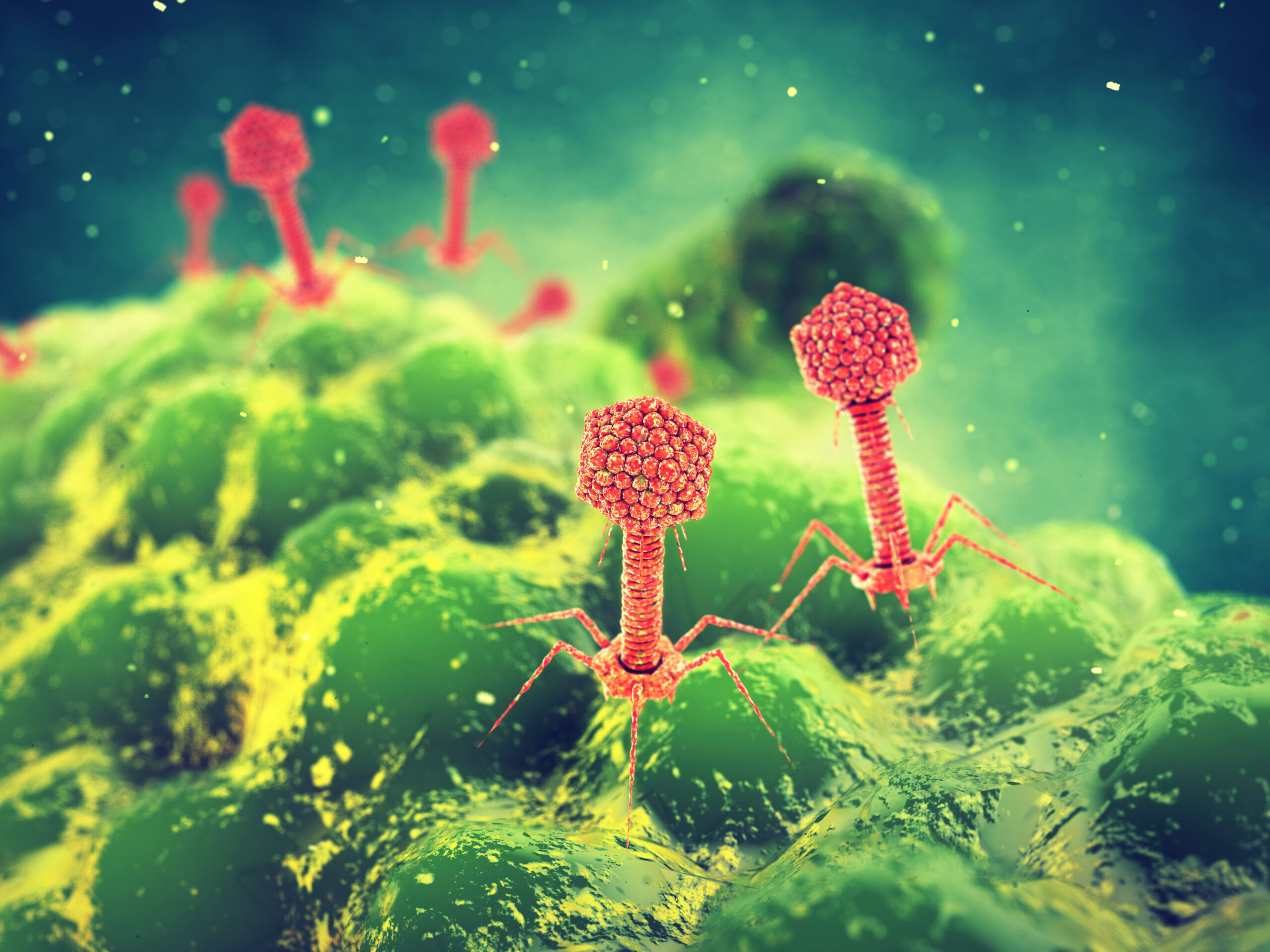“Health for all” is the theme of this year’s World Health Day, celebrated on April 7. It’s also a theme for many researchers at the Department of Energy’s Lawrence Berkeley National Laboratory (Berkeley Lab). Their work is advancing how we treat cancer, develop antibiotics, diagnose diseases, cope with COVID, and more.
Here are seven ways Berkeley Lab researchers are working toward health for all:
Discovering new antibiotics within the viruses that infect bacteria
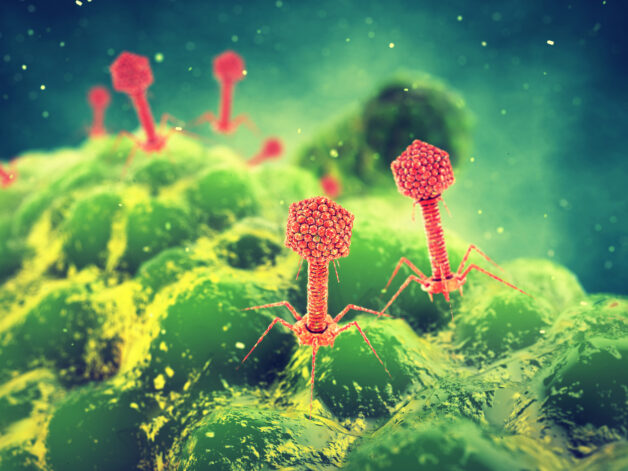
A rendering of bacteriophage viruses attacking a bacteria. (Credit: nobeastsofierce/Adobe Stock)
Bacteriophages, the viruses that infect bacteria, could be the key to combating drug-resistant bacterial infections. These tiny viruses have evolved potent protein weapons that are deadly to their host strain, but harmless to human cells. Studying phages can be challenging and slow going, because these entities are difficult to isolate from the environment and examine in a lab. Our researchers have developed fast and efficient techniques to discover and characterize phages and their proteins, so we can expedite the development of new antibiotics.
Tackling long COVID with machine learning
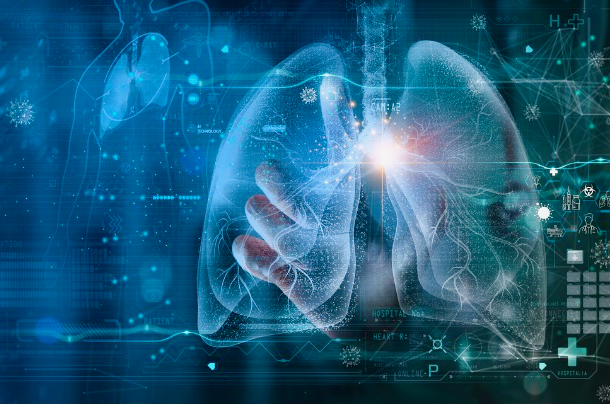
(Credit: iStock/greenbutterfly)
Researchers have developed a new machine learning tool that sheds light on the wide range of chronic COVID symptoms, and can identify strong correlations between different long COVID subtypes and pre-existing conditions such as diabetes and hypertension. This research will help improve our understanding of how and why some individuals develop long COVID symptoms and may enable more effective treatments by helping clinicians develop tailored therapies for each group.
A faster, safer way to study dangerous infections
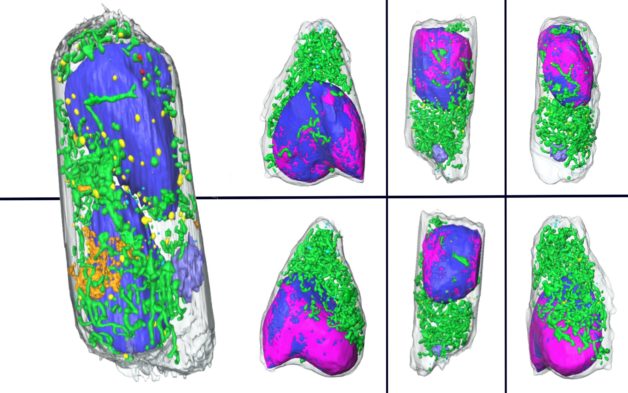
Digital images of cells infected with SARS-CoV-2, created from soft X-ray tomography taken of chemically fixed cells at the Advanced Light Source. (Credit: Loconte et al./Berkeley Lab)
Researchers from Berkeley Lab and Heidelberg University in Germany cranked up the speed of studying infected cells using a microscopic imaging technique that can generate incredibly detailed 3-D scans. Their approach takes mere minutes to gather data that would require weeks of prep and analysis with other methods, giving scientists an easy way to examine how our cells respond to pathogens (such as SARS-CoV-2) and how the cells respond to drugs. Their approach also chemically kills and preserves the cells, which allows many labs to safely image infected cells without the inherent risks of working with live infected cells.
New approaches to cancer treatment using particle accelerators
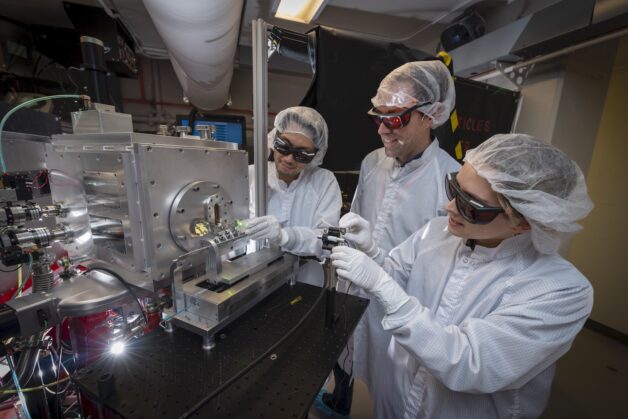
Kei Nakamura, Antoine Snijders and Lieselotte Obst-Huebl (from left) at the BELLA laser facility aligning cartridges containing human cells in the proton beam path. (Credit: Berkeley Lab)
Biologists and physicists at Berkeley Lab have teamed up to create new opportunities for cancer treatment using laser-generated proton beams. The ongoing project seeks to make a more effective type of radiation therapy more readily available to patients. Researchers are also investigating the potential benefit of using accelerators to deliver proton beam radiation therapy at ultrahigh doses within extremely short exposure times – a technique called FLASH radiotherapy. Though the approach remains experimental for now, FLASH radiotherapy could change the landscape of radiation oncology.
Harnessing microbes to boost supply of an important anti-cancer drug
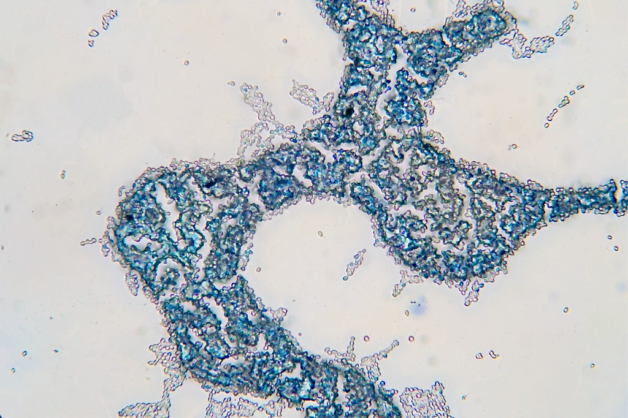
Saccharomyces cerevisiae under a microscope. (Credit: tonaquatic/iStock)
Synthetic biology pioneer Jay Keasling was part of an international team that engineered yeast to produce the precursor molecules for the chemotherapy drug vinblastine. Previously, the drug could only be obtained in trace concentrations from the native plant that produces it, and hundreds of pounds of leaves were needed to make one dose. The breakthrough ensures that the supply of this plant-derived anti-cancer drug can finally meet global demand.
‘Fingerprinting’ cells to improve Alzheimer’s diagnosis
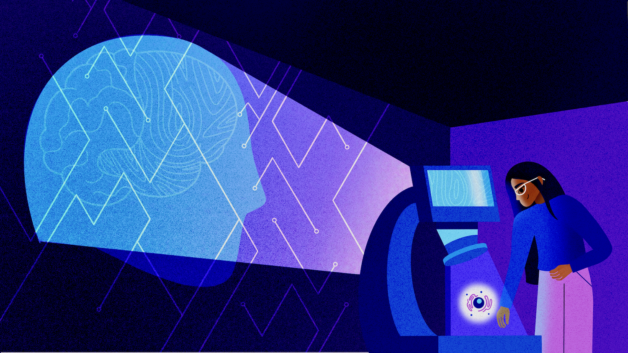
(Credit: Jenny Nuss/Berkeley Lab)
A technology developed by scientists at Berkeley Lab shows great promise for diagnosing Alzheimer’s disease before symptoms arise, potentially changing the course of research and treatment for this condition, which affects millions of people worldwide and is estimated to be the sixth leading cause of death in the United States. By combining infrared light analysis and machine learning, the new, non-invasive testing process shows potential to break barriers in disease detection.
Minimizing virus spread with indoor-air cleaning

(Credit: Berkeley Lab)
Researchers at Berkeley Lab have found strong evidence that indoor environmental controls – such as ventilation, filtration, airflow management, and UV light disinfection – can effectively reduce the spread of virus transmission, making it safer for us to share spaces as we navigate a post-Covid world. The researchers thoroughly reviewed the state of the science for several key building technologies strategies to reduce airborne infection risk.
# # #
Founded in 1931 on the belief that the biggest scientific challenges are best addressed by teams, Lawrence Berkeley National Laboratory and its scientists have been recognized with 16 Nobel Prizes. Today, Berkeley Lab researchers develop sustainable energy and environmental solutions, create useful new materials, advance the frontiers of computing, and probe the mysteries of life, matter, and the universe. Scientists from around the world rely on the Lab’s facilities for their own discovery science. Berkeley Lab is a multiprogram national laboratory, managed by the University of California for the U.S. Department of Energy’s Office of Science.
DOE’s Office of Science is the single largest supporter of basic research in the physical sciences in the United States, and is working to address some of the most pressing challenges of our time. For more information, please visit energy.gov/science.
